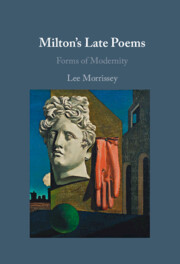Introduction
Forms of Modernity
Published online by Cambridge University Press: 18 August 2022
Summary
Milton’s last poems operate as an array, a contiguous set of shifts in narrative and generic evaluation published over just a seven-year period. Charles Taylor argues that modernity “must be understood as . . . multiform contestation.” In Milton’s last three poems, it is. As an epic as a sui generis brief epic, and as a tragedy, respectively, Paradise Lost, Paradise Regained, and Samson Agonistes represent, then, the values, the pressures, and sometimes even the losses, of pluralism. That these positions can overlap, though, is central to Milton’s contribution to a discussion of modernity, contrary to the familiar epochal break and shift of ideas that modernity is usually taken to represent. The different responses to the experience of modernity, while not necessarily modern, are part of that modernity nonetheless. In the introduction, I preliminarily I develop senses of modernity and responses to it. I also explore the relationship between context, fiction, anachronism, and the novel in the reception of Milton three late poems.
Keywords
- Type
- Chapter
- Information
- Milton's Late PoemsForms of Modernity, pp. 1 - 34Publisher: Cambridge University PressPrint publication year: 2022

